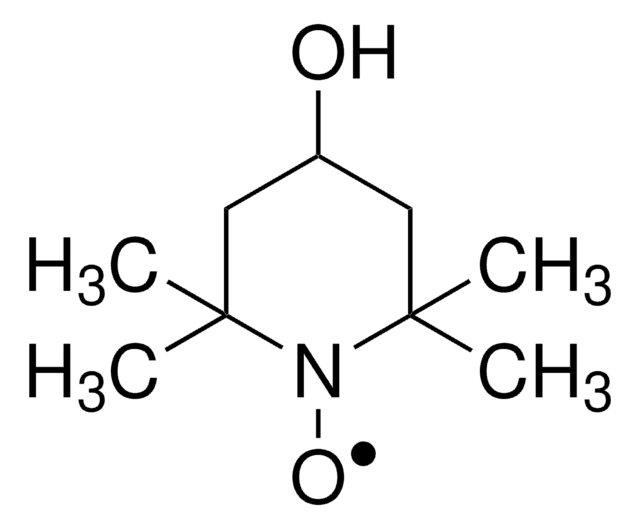Wichtige Dokumente
T7024
N,N,N′,N′-Tetramethylethylendiamin
BioReagent, for molecular biology, ≥99% (GC)
Synonym(e):
1,2-Bis(dimethylamino)ethan, TEMED, TMEDA
About This Item
Empfohlene Produkte
Qualität
Molecular Biology
for molecular biology
Produktlinie
BioReagent
Assay
≥99% (GC)
Expl.-Gr.
9.08 %
Methode(n)
GC/GC: suitable
Brechungsindex
n20/D 1.4179 (lit.)
bp
120-122 °C (lit.)
mp (Schmelzpunkt)
−55 °C (lit.)
Dichte
0.775 g/mL at 20 °C (lit.)
Fremdaktivität
DNase, RNase, protease, none detected
SMILES String
CN(C)CCN(C)C
InChI
1S/C6H16N2/c1-7(2)5-6-8(3)4/h5-6H2,1-4H3
InChIKey
KWYHDKDOAIKMQN-UHFFFAOYSA-N
Suchen Sie nach ähnlichen Produkten? Aufrufen Leitfaden zum Produktvergleich
Anwendung
TEMED is a tertiary amine that is used to catalyze the formation of free radicals from ammonium persulfate or riboflavin. TEMED-generated free radicals cause the compounds acrylamide and bis-acrylamide to polymerize and form the gel matrix polyacrylamide. Because TEMED is functional only in its free base form, low pH conditions will inhibit polymerization.,,
The potential contribution of TEMED to elevated background in silver stained SDS PAGE has been studied. TEMED has been used in the coating of soft polymers, such as polyacrylamide, in capillaries for investigation by atomic force microscopy. Microchips containing oligonucleotides and proteins immobilized within gel pads have been prepared using TEMED.
The capillary isoelectric focusing of proteins with an isoelectric point (pI) > 12 has been investigated through the use of TEMED. TEMED has been used in the HPLC of small organic molecules.
Menge
Signalwort
Danger
H-Sätze
Gefahreneinstufungen
Acute Tox. 3 Inhalation - Acute Tox. 4 Oral - Eye Dam. 1 - Flam. Liq. 2 - Skin Corr. 1B
Lagerklassenschlüssel
3 - Flammable liquids
WGK
WGK 1
Flammpunkt (°F)
61.7 °F - closed cup
Flammpunkt (°C)
16.5 °C - closed cup
Persönliche Schutzausrüstung
Faceshields, Gloves, Goggles, type ABEK (EN14387) respirator filter
Hier finden Sie alle aktuellen Versionen:
Besitzen Sie dieses Produkt bereits?
In der Dokumentenbibliothek finden Sie die Dokumentation zu den Produkten, die Sie kürzlich erworben haben.
Kunden haben sich ebenfalls angesehen
Unser Team von Wissenschaftlern verfügt über Erfahrung in allen Forschungsbereichen einschließlich Life Science, Materialwissenschaften, chemischer Synthese, Chromatographie, Analytik und vielen mehr..
Setzen Sie sich mit dem technischen Dienst in Verbindung.









